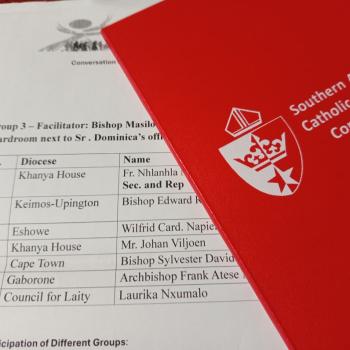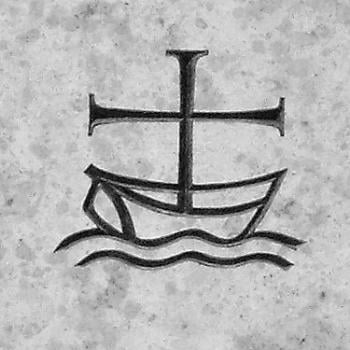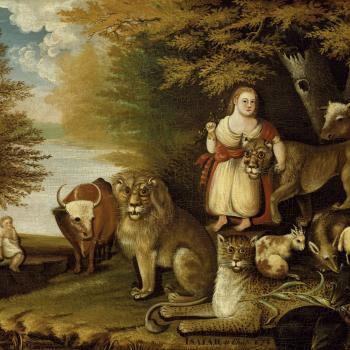This is the final reflection in our Advent Series, "The Hopes and Fears of All the Years," by biblical scholars and preachers John C. Holbert and Alyce McKenzie. For an overview of the series with links to all the reflections, click here.
First Sunday after Christmas Day
Isaiah 63:7-9
My wife was for a time one of the associate pastors of a large suburban church in the Dallas area. The oldest associate pastor, a man who had been in ministry for over fifty years, used to say that he was "the Sunday after Christmas preacher," and at the end of his once-a-year sermon would always say to the congregation, "See you all next year!" It gets a big laugh, but those of us in pastoral ministry know all too well that the huge crowds on Christmas Eve will hardly be matched by the sparse remnant that shows up on the Sunday after Christmas. I understand this fact in its humanity: the trumpets, large choirs, and favorite carols naturally overwhelm any return to the more mundane realities of a post-Christmas world. The after-Christmas sales beckon more temptingly than any after Christmas worship.
Well, should we preachers just take the day off and pass the torch to an associate (if we are fortunate enough to have one)? Or if no associate is to hand, why not sing a bunch of our favorite hymns (since the choir is down in numbers and exhausted to boot), reduce the liturgy a bit, give the faithful a break, thereby helping them, finally, to beat their Baptist friends to the cafeteria? How best to face the post-Christmas worship?
We always need to remember it is our most faithful who have come on this forgotten day of the church year. They have sung the carols and lighted the Advent candles, and dressed the children for the pageant, and ordered the poinsettias, and arranged the sanctuary just so. They have come, because they always come, but also because they want to hear what the whole thing was finally about.
Now that we got Jesus born again, what do we do now? I admit to liking this Sunday a good deal, because I do want to think about and sing about and pray about that huge question: what now?
Isaiah 63:7-9 is the lectionary's way of beginning an answer. However, it is important to place these three verses in their larger context. Chapter 63 begins with a powerful and quite graphic poem hymning the "day of vengeance of our God" (Is. 61:2). Using Edom as a metaphor for all of God's enemies, the awesome God comes in splendid robes that soon turn red in the blood of the divine enemies. God is described as "alone treading the wine press, trampling them in anger, their juice spattering my garments" (63:2-3).
This is gruesome talk and must be interpreted carefully as poetic language, not literal claims about the use of God's power. These poems have been composed after the worst tragedy of Israel's long history, the exile into Babylon. The people have been rendered powerless as they were forced eastward toward a long future in a Babylonian ghetto. The poet announces the need for a God who has unleashed might on behalf of the exiles. And once they have returned to their shattered land of Israel, after the defeat of Babylon by the armies of Persia, they find little hope and again need a God worthy of the great challenge of rebuilding practically from nothing.
Poets exercise their huge imaginations to offer hope to those who have no hope. This God has acted throughout the long history of God's people, and the poet wishes to remind them of those actions for them, the chosen ones. So, he now "recounts the gracious deeds of YHWH, the praiseworthy acts of YHWH" (63:7ab). One could also translate these lines: "I will remember YHWH's acts of unbreakable love, YHWH's ringing hymns!" YHWH has acted and we have sung in response, because "of all YHWH has done for us, great good to the house of Israel that YHWH has shown according to God's mercy (compassion—Hebrew is literally 'womb'), according to the abundance of steadfast love (or "unbreakable love)" (63:7cd). The poet has here reached into the deep language of the very center of Israel's faith and is reminding them of God's good deeds from the foundation of the nation.
"Because God said, 'They are surely my people, children who will not deal falsely' (or perhaps "who will tell no lies"); so God became their savior in all their distress" (63:8-9a). God's hopes for the people were that they would be truth tellers, trustworthy children for whom God would be a savior in all occasions of pain or struggle. Verse 9bc is very difficult to translate, but it could be read, "There was no anguished messenger; it was God's own presence that saved them." Then, to continue the thought, "In God's love and pity, God redeemed them; God lifted and carried them through all their past days" (NRSV's "all the days of old" is less than clear).





